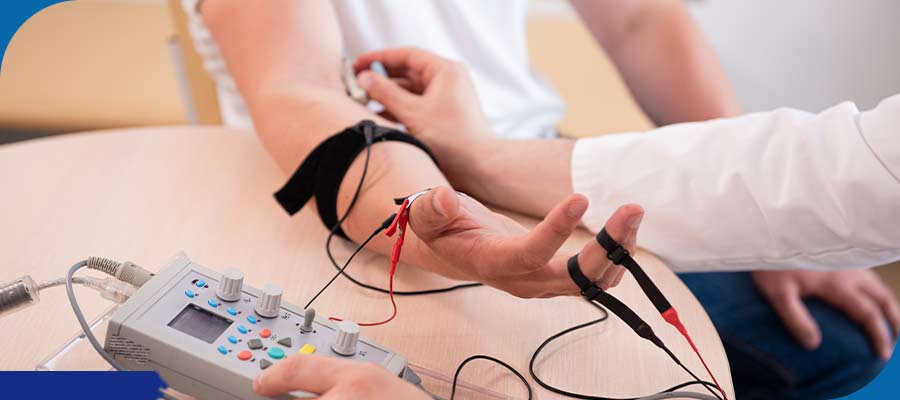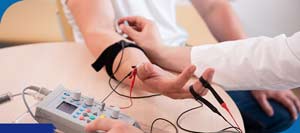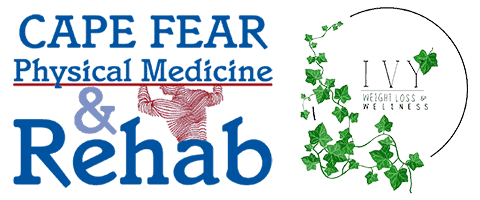What Is an EMG Test?
An Electromyography (EMG) test measures muscle and nerve electrical activity to diagnose conditions like muscle weakness or numbness. At Cape Fear Physical Medicine and Rehab, our professional team uses EMG testing to assess muscle and nerve health, helping identify issues such as neuropathies and muscle disorders for targeted treatments. Contact us today for more information, or schedule an appointment online! We are conveniently located at 1540 Purdue Dr, Ste. 200, in Fayetteville, NC 28303.


Table of Contents:
What is an EMG test, and what does it measure?
Why would a doctor recommend an EMG test?
How is an EMG test performed?
What conditions can an EMG test diagnose?
At Cape Fear Physical Medicine and Rehab, we offer advanced diagnostic procedures such as electromyography (EMG) to accurately assess and diagnose neuromuscular issues. An EMG (Electromyography) test is a diagnostic procedure that evaluates the health of your muscles and the nerves that control them. It directly measures the electrical activity produced by your muscles, both when they are at rest and when they are contracting.
By observing these electrical signals, doctors can identify if there are problems with the nerves transmitting signals to the muscles, the muscles themselves, or the critical connection point where nerves meet muscles. This test is crucial for understanding the root cause of symptoms such as muscle weakness, numbness, tingling, or unexplained pain, providing insights into the functional integrity of your neuromuscular system.
Often, an EMG is performed in conjunction with a Nerve Conduction Study. While the EMG focuses on the muscle’s response to nerve signals, the NCS directly assesses the speed and strength of electrical signals traveling along your nerves. This two-part approach allows healthcare professionals to differentiate between a wide range of conditions, including nerve damage (like carpal tunnel syndrome or sciatica), muscle disorders (such as muscular dystrophy), or issues at the neuromuscular junction (like myasthenia gravis). The information gathered from an EMG helps pinpoint the exact location and nature of neurological or muscular dysfunction, guiding appropriate diagnosis and treatment.
At Cape Fear Physical Medicine and Rehab, our specialists may recommend electromyography (EMG) testing to comprehensively evaluate patients experiencing muscle weakness, numbness, tingling, or persistent muscle pain.
A doctor would typically recommend an EMG test when a patient is experiencing symptoms that suggest a potential problem with their nerves or muscles. These symptoms often include persistent muscle weakness, numbness, tingling sensations (often described as “pins and needles”), muscle pain, cramping, or involuntary muscle twitching. The test helps to determine if these symptoms are due to a nerve disorder, a muscle disorder, or an issue with the communication between nerves and muscles.
By evaluating the electrical activity in muscles, an EMG can help pinpoint the exact location and severity of nerve or muscle damage. This information is crucial for an accurate diagnosis, which then allows the doctor to develop the most appropriate treatment plan. For example, it can differentiate between conditions like a pinched nerve, carpal tunnel syndrome, and muscular dystrophy.
EMG testing is an integral part of delivering personalized, accurate diagnoses and developing targeted therapeutic interventions to help patients regain optimal function and quality of life.
Cape Fear Physical Medicine and Rehab offers electromyography (EMG) testing as part of our comprehensive approach to diagnosing and managing neuromuscular conditions. An EMG test is typically performed by a neurologist or a specially trained technologist. The procedure primarily involves the insertion of very fine, sterile needle electrodes directly into specific muscles that the doctor wants to examine. Before insertion, the skin over the muscle is usually cleansed with an antiseptic solution. While the needle is in place, the electrical activity of the muscle is recorded and displayed on a monitor as wave patterns, and often an audio amplifier allows the activity to be heard.
During the test, the patient will be asked to first relax the muscle being examined, as healthy muscles typically show little to no electrical activity at rest. Then, they will be instructed to perform slight and then more forceful contractions of the muscle. The electrical activity generated during these contractions is carefully monitored. The size, shape, and frequency of the electrical signals provide valuable information about the health and function of the muscle and the nerves controlling it. Several muscles may be tested depending on the patient’s symptoms, and the entire process can take anywhere from 30 to 90 minutes.
At Cape Fear Physical Medicine and Rehab, our skilled team specializes in advanced diagnostic procedures, including electromyography (EMG), to effectively evaluate and treat neuromuscular conditions. An Electromyography (EMG) test is a diagnostic procedure that evaluates the health of muscles and the nerve cells that control them, called motor neurons. It can reveal nerve dysfunction, muscle dysfunction, or problems with the transmission of signals between nerves and muscles.
EMG tests can diagnose a wide range of conditions affecting the peripheral nerves (nerves outside the brain and spinal cord), nerve roots exiting the spinal cord, muscles themselves, and the neuromuscular junction where nerves and muscles communicate. This includes common conditions like carpal tunnel syndrome and pinched nerves (radiculopathy), as well as more complex and serious disorders such as amyotrophic lateral sclerosis (ALS), muscular dystrophy, myasthenia gravis, and peripheral neuropathy.
By carefully interpreting the results of EMG testing, our team at Cape Fear Physical Medicine and Rehab can precisely diagnose conditions, determine severity, and develop individualized treatment strategies to help patients achieve optimal functional outcomes and improved quality of life. Contact us today for more information, or simply schedule an appointment online! We are conveniently located at 1540 Purdue Dr, Ste. 200, in Fayetteville, NC 28303. We serve patients from Fayetteville NC, Woodfield NC, Hope Mills NC, Fort Bragg NC, Eastover NC, and surrounding areas.

Check Out Our 5 Star Reviews


Additional Services You May Like
▸ Weight Loss & Wellness Program
▸ Botox for Migraine
▸ EMG Nerve Conduction Studies
▸ Epidural Steroid Injections
▸ Radiofrequency Ablation
▸ Rehabilitation Consultations
▸ Facet Injections
▸ Sacroiliac Joint Injections
▸ Joint Injections
▸ Genicular Nerve Blocks
▸ Prosthetic Evaluation/Management
▸ Adjuvant Therapy/Care
▸ Spasticity Management
▸ Stroke Treatment
▸ Multiple Sclerosis
▸ Spinal Cord Injury
▸ Traumatic Brain Injury
▸ Lifestyle Medicine
▸ Phentermine
▸ Qsymia
▸ Contrave

Additional Services You May Like
▸ Weight Loss & Wellness Program
▸ Botox for Migraine
▸ EMG Nerve Conduction Studies
▸ Epidural Steroid Injections
▸ Radiofrequency Ablation
▸ Rehabilitation Consultations
▸ Facet Injections
▸ Sacroiliac Joint Injections
▸ Joint Injections
▸ Genicular Nerve Blocks
▸ Prosthetic Evaluation/Management
▸ Adjuvant Therapy/Care
▸ Spasticity Management
▸ Stroke Treatment
▸ Multiple Sclerosis
▸ Spinal Cord Injury
▸ Traumatic Brain Injury
▸ Lifestyle Medicine
▸ Phentermine
▸ Qsymia
▸ Contrave







